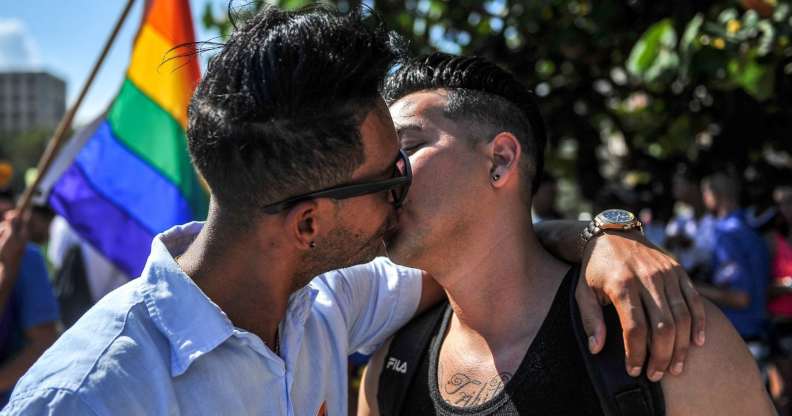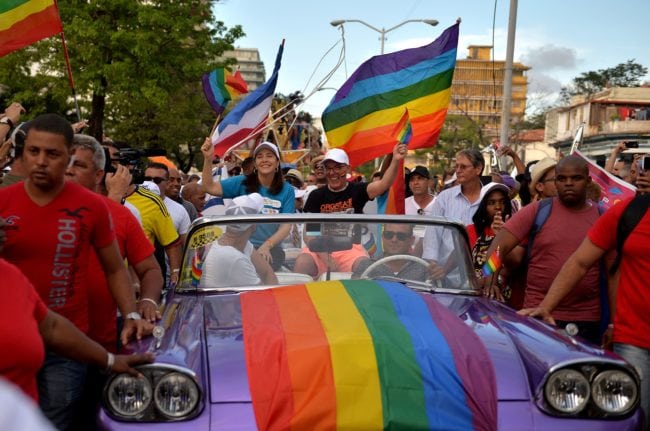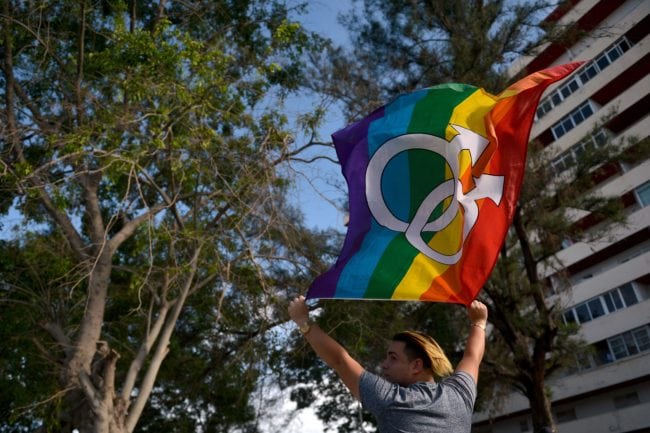The Catholic Church wants Cubans to reject same-sex marriage

Members of the gay and lesbian community kiss as they participate in a march against homophobia on May 14, 2016 in Havana. / AFP / YAMIL LAGE (Photo credit should read YAMIL LAGE/AFP/Getty Images)
The Catholic Church has encouraged Cubans to oppose a constitutional change to the definition of marriage that would allow of same-sex weddings to become legal on the island.
The change would make the constitutional definition of marriage gender-neutral, defining it as the “voluntary and consensual union between two people without distinction of sex.”
After being approved by the country’s legislative assembly in July as part of a broader constitutional reform, the text’s new version will have to be approved in a popular vote to become official.

Mariela Castro (C) participates in the gay pride parade during the celebration of the day against homophobia and transphobia in Havana, on May 12, 2018 (Yamil Lage/AFP/Getty)
The archbishop of Santiago de Cuba, Dionisio García Ibáñez, called on Cubans to defend the definition of marriage as the union between a man and a woman in a long letter published on Wednesday on the website of Cuba’s Catholic Church and quoted in Agence France Press (AFP).
As part of his arguments, Garcia called the acceptance of same-sex marriage as being foreign to Cuban values. He claimed it stemmed instead from the “cultural imperialism” of powerful countries who use globalisation “to create a uniform culture that accepts and adopts its criteria (while) disqualifying those of others,” a practice he compared to “ideological colonialism.”
A group of Evangelical churches in the country have used similar arguments as they campaigned against the changees with leaflets promoting marriage as the union of a man and a woman.
Local LGBT+ activists created their own posters in support of same-sex marriage, portraying different examples of family configurations and expressing support for the “Cuban design—a very original family,” as Reuters reported.
LGBT+ people in Cuba were once persecuted and sent to prison labor camps under the leadership of Fidel Castro, who led a coup against the US-backed regime of Fulgencio Batista in 1959. Homosexual acts were decriminalised in 1979 and in 2006 Castro admitted his responsibility in the “great injustice” against the LGBT+ community.

A Cuban waves the rainbow flag at the gay pride parade during the celebration of the day against homophobia and transphobia in Havana, on May 12, 2018 (Yamil Lage/AFP/Getty)
His niece Mariela Castro, daughter of Fidel’s brother and successor Raul Castro, has become a vocal supporter of LGBT+ rights in the country in her role as director of Cuba’s National Centre for Sex Education. She has championed initiatives such as making the state pay for gender affirmation surgeries and same-sex couples adoption.

